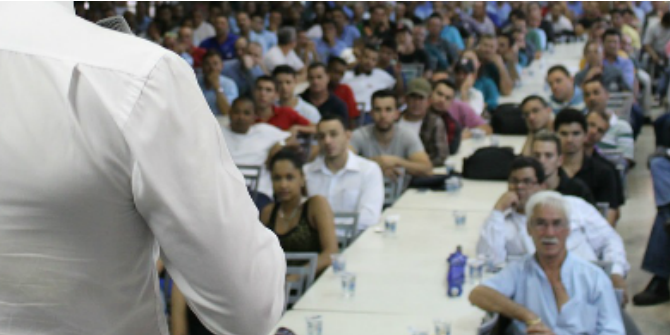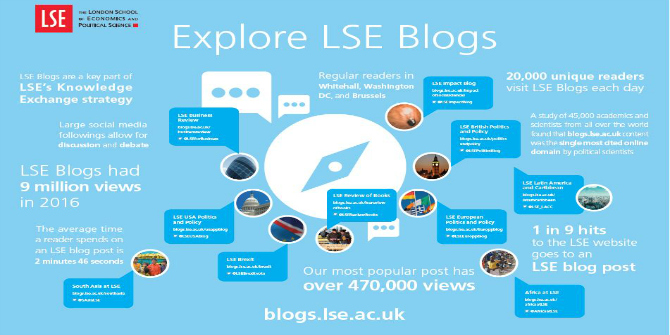 Was Michael Gove wrong to say the public had “had enough of experts”? Not exactly, argues Peter Dennis. In also appealing to the public to trust themselves, Gove touched a deeper nerve, one running back to Kant, the Enlightenment and intellectual autonomy. However, whereas in Kant’s day the public was the same group of people to whom both political and scientific arguments were addressed, this is not the case today. The Open Science and Citizen Science movements attempt to reassociate the political and scientific publics and bring about an “inquiring society”, where participation in (and scrutiny of) scientific research is open to all.
Was Michael Gove wrong to say the public had “had enough of experts”? Not exactly, argues Peter Dennis. In also appealing to the public to trust themselves, Gove touched a deeper nerve, one running back to Kant, the Enlightenment and intellectual autonomy. However, whereas in Kant’s day the public was the same group of people to whom both political and scientific arguments were addressed, this is not the case today. The Open Science and Citizen Science movements attempt to reassociate the political and scientific publics and bring about an “inquiring society”, where participation in (and scrutiny of) scientific research is open to all.
Ever since Michael Gove spoke his by now immortal words, “the experts” have been scratching their heads over why people no longer seem to trust them. But the reason British voters ignored the preponderance of expert opinion was not that they did not trust the experts. Instead, the universally accepted wisdom of “trust the experts” was outpaced by a more compelling and seductive narrative: “trust yourself”.
Numerous explanations have been given for the public’s purported distrust of experts. Some have chalked it up to economists’ failure to predict the financial crisis; others to a perception of experts as technocratic rather than beneficent; and yet others to academics’ most cherished habit of using a long word where a short one will do.
 Image credit: Michael Gove at Policy Exchange delivering his keynote speech ‘The Importance of Teaching’ by Policy Exchange. This work is licensed under a CC BY 2.0 license.
Image credit: Michael Gove at Policy Exchange delivering his keynote speech ‘The Importance of Teaching’ by Policy Exchange. This work is licensed under a CC BY 2.0 license.
But the fact is the public do trust experts. Cardiologists’ waiting rooms remain overcrowded, financial advisors are still in work, and Jamie Oliver’s recipes are as popular as ever. Even on issues relating to the referendum, an Ipsos Mori survey conducted in May last year found that academics were the third most trusted group (among both Remain and Leave voters), above 13 other groups including newspapers, charities, and big British businesses.
So was Gove simply wrong to say the public had “had enough of experts”? Not exactly. When asked why the public should trust him over a long list of expert bodies, what he actually said was: “I’m not asking the public to trust me. I’m asking the public to trust themselves.” This was not a plea to diminish our confidence in experts, but to have confidence in ourselves.
“Don’t trust me to show you love
When my love may be only lust
If you want somebody you can trust, trust yourself” (Bob Dylan, Trust Yourself)
Gove’s plea might seem to embody all of the cynical flattery of the Dylan song, and indeed flattery is no small part of its appeal. Like an ad for Marlboros, it enjoins us to stand firm in our own outlook rather than defer to those who may know better.
Placed in its political context, however, the appeal to “trust yourself” touches a deeper nerve, one which runs back to Kant. In his essay, “What is Enlightenment?”, Kant famously enjoined his readers to sapere aude—dare to know; dare to challenge the authorities of the day; dare to reason things out for yourself. Without this intellectual (i.e. epistemic) autonomy, Kant thought, there could be no such thing as political autonomy. After all, what is the point in being allowed to determine your own destiny if you are prevented from making up your own mind about the relevant facts?
“Enlightenment is man’s release from his self-incurred tutelage. Tutelage is man’s inability to make use of his understanding without direction from another. Self-incurred is this tutelage when its cause lies not in lack of reason but in lack of resolution and courage to use it without direction from another. Sapere aude! ‘Have courage to use your own reason!’ – that is the motto of enlightenment.”
Unlike the fretful (and illogical) counsel not to trust experts, this is a narrative someone can get behind. And once the connection between epistemic autonomy (thinking for yourself) and political autonomy (governing yourself) is made explicit, it is hardly surprising that it appealed to voters concerned about sovereignty and democracy. On offer was a relegitimised, enlightened Marlboro Man, unafraid to use his own reason against authorities both political and epistemic.
The opposition between the two dominant narratives of the referendum campaign (“trust yourself” vs. “trust the experts”) has a tragic structure, since it pits the two great legacies of the Enlightenment—science and democracy—against one another. Learning from experts means letting others think for us, whereas democracy insists that we think for ourselves. Presented as a choice between science and democracy, Brexit starts to make sense.
But this is not a choice that could have occurred to Kant, or to the early scientists of the Royal Society. For them, thinking for oneself was precisely what distinguished scientific knowledge from the kind promulgated by the monarchy or the Church. Rather than imposing their beliefs on others, they prided themselves on demonstrating their beliefs to them—either by conducting public experiments or by publishing their findings in the first scientific journals. In this way, they respected—and depended on—their audience’s ability to think for themselves.
 Image credit: An Experiment on a Bird in an Air Pump by Joseph Wright of Derby, 1768 [public domain], via Wikimedia Commons.
Image credit: An Experiment on a Bird in an Air Pump by Joseph Wright of Derby, 1768 [public domain], via Wikimedia Commons.
So what has happened since the Enlightenment to allow its two great legacies to be served up as such an unappetising dilemma? The answer is that the identity of “the public” has changed. In Kant’s day, “the public” was the same group of people to whom both political and scientific arguments were addressed. Voters, like members of the Royal Society, according to Thomas Sprat, were largely “gentlemen, free, and unconfin’d”. The point here is not that the voting public was therefore more scientifically informed than it is now, but that scientific knowledge was not something it was expected to take on trust. Rather it was knowledge that had been demonstrated to them, or at least stood ready to be demonstrated. By contrast, today’s scientific demonstrations are not even notionally addressed to the voting public, who must either remain ignorant of scientific knowledge or else receive it by faith.
This dissociation of the political and scientific publics has happened for good reasons. The political public has got wider because of greater enfranchisement (political progress). At the same time, the scientific public has got narrower as science has become more complex and harder to understand (scientific progress). But if we are to continue to make progress in both domains, we must urgently find a way to reassociate them.
Later this week I will be chairing a panel event at the Forum for European Philosophy on how we might try to do that. One solution is that we need more public engagement and dissemination of scientific knowledge. But unless this is more than an education project, it may be no different to what Kant regarded as “tutelage”. On the other hand, the Open Science and Citizen Science movements propose a more radical way to rethink the relationship between scientists and their public. By abandoning the distinction between “producers” and “consumers” of scientific knowledge, these movements attempt to bring about an “inquiring society”, where participation in (and scrutiny of) scientific research is open to all. But is this idealistic vision possible, and how might it be achieved? These are the questions we will put to our panel.
The Citizen Science panel event is free to attend and will take place on Thursday 16 March, from 6:30pm to 8pm. For more information, including the list of speakers, please visit the event web page.
Note: This article gives the views of the author, and not the position of the LSE Impact Blog, nor of the London School of Economics. Please review our comments policy if you have any concerns on posting a comment below.
About the author
Peter Dennis is an LSE Fellow in the Department of Philosophy, Logic, and Scientific Method. His research in epistemology seeks to understand how we come to be justified in our beliefs, and how this relates to our ability (or otherwise) to justify ourselves to those who don’t think like us. He completed his PhD at Reading University in 2013, and his MA is from the University of Paris VIII.







